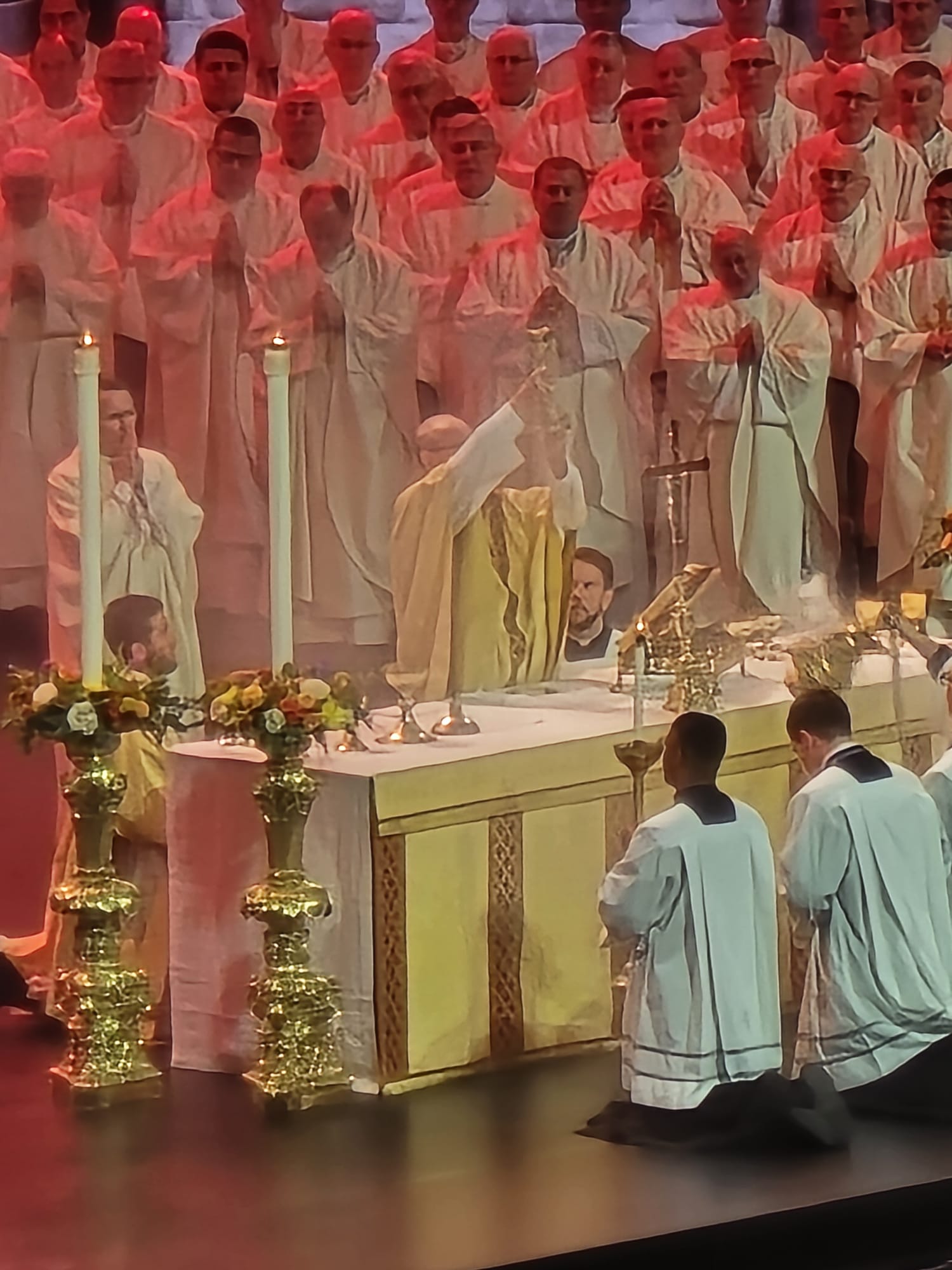
The 10th National Eucharistic Congress, taking place in Indianapolis from July 17 to 21, 2024, marks a historic moment for the Catholic Church in the United States. This gathering, the first of its kind in over 80 years, is a profound celebration of the Eucharist and a testament to the enduring love of Jesus Christ. This event not only draws tens of thousands of faithful from across the country but also symbolizes a critical phase in the ongoing National Eucharistic Revival.
A Historic Gathering
Cardinal Timothy Dolan, Archbishop of New York and president of the Board of Directors of the Pontifical Mission Societies USA, opened the Congress with a stirring homily at Lucas Oil Stadium. “The Eucharist is the heart of our faith and the source of our love. It is in the Eucharist that we encounter the true presence of Christ, who gave Himself entirely for us. This Congress is a powerful reminder of that sacrificial love and a call for us to live it out in our daily lives”.
“My brothers and sisters, to recover the centrality of Sunday Mass as God’s people are fed with the bread of life has to be the resolve of this grand Eucharistic Congress,” the Cardinal said. “As Pope Francis has repeated, no Eucharist, no Church.”
Cardinal Dolan cited the pope’s 2018 guidance on the Eucharist, in which he said, “The Eucharist is not a beautiful rite, but it is the most intimate, the most concrete, the most surprising communion that one can imagine with God: a communion of love so real that it takes on the form of eating.’
“The Holy Eucharist is a sacrifice, the real presence, and a meal, right? The Masses are sacrifices,” Cardinal Dolan said. “The Eucharist is the real presence of Christ, body, blood, soul, and divinity as we adore him locked in the tabernacle, in the monstrance on the altar, or carried in procession.”
Similarly, Cardinal Sean O’Malley, Archbishop of Boston, emphasized the transformative power of the Eucharist during a liturgy in Spanish held in the Convention Center of Indianapolis. The prelate, who is also a member of the board of The Pontifical Mission Societies, said that the world is ruled by people suffering from spiritual amnesia. “They have forgotten God,” he said, which causes people not to go to Mass, and he continued, “I see fewer people in Church today than when I was growing up. Many have even forgotten what Mass is all about. ”
Therefore, O’Malley emphasized, “this Eucharistic Congress is important because it helps us to understand that as disciples of Christ, the Eucharist must be the center of our lives. God loves us and nourishes us because the Eucharist is the madness of God’s love,” the cardinal said.
“The Eucharist is not just a symbol but the real presence of Jesus Christ, a mystery that calls us to repentance and renewal. In receiving the Eucharist, we are invited to become what we receive—the Body of Christ—committed to spreading His love and mercy to all”.
The National Eucharistic Revival
The Congress is a pinnacle event in the broader context of the National Eucharistic Revival, a three-year initiative launched by the U.S. Conference of Catholic Bishops (USCCB) aimed at renewing the Church’s faith in the Real Presence of Jesus in the Eucharist. Bishop Andrew Cozzens of Crookston, Minnesota, and chairman of the National Eucharistic Congress, described this initiative as potentially transformational for the Catholic Church in the U.S.: “I believe this event and the National Eucharistic Pilgrimage leading up to it will have a generational impact on our country”.
Inspiring Testimonies
Mother Olga of the Sacred Heart, speaking at a revival session on Thursday, shared a moving testimony about the impact of the Eucharist on her life and ministry: “Only love can make a saint. It is this love, found in the Eucharist, that transforms us and gives us the strength to serve others. The Eucharist is the greatest gift we have, a gift that compels us to share God’s love with everyone we meet”.
The founder and servant mother of the Daughters of Mary of Nazareth in the Archdiocese of Boston, moved people to tears with her touching keynote as she shared stories of Eucharistic miracles of love and healing amid suffering.
She began by sharing her own experience of being healed by Jesus in her own suffering as a survivor of four wars in the Middle East. She experienced abuse in her home and recalled as a teenager having to bury people slain by war.
“All these years of suffering led me to the foot of the cross, because I thought the one who had suffered so much will understand my suffering,” she said. “As I was kneeling at the foot of the cross, crying my heart to Jesus to help me bear the crosses of my own life, I encountered the pierced heart of Jesus — and that’s what I heard in my heart on that day: That even on the cross and through the cross, we can still choose to love.”
She recounted her experiences helping a young cancer patient and a significantly premature baby access the Eucharist. Both defied the odds and are thriving today, she said.
“I give thanks to God for allowing me to be present and to witness these miracles so I can come and be a voice for him and for them, so that you go out and share with everybody. Eucharistic miracles are real and Our Lord truly present, and he’s here in our midst, wherever you go, any parish, any church, any diocese,” she said.
Father Mike Schmitz, during a morning impact session, urged attendees to embrace repentance as a path to experiencing the fullness of God’s love in the Eucharist.
Comparing Catholics today to the people of Jerusalem to whom the prophet Jeremiah preached about the need to repent, Schmitz said the problem is not that we don’t know about the Eucharist, it’s that we are indifferent to it.
“Too often,” he said, Catholics are “the people Jeremiah was speaking to. … We say, ‘We have the Real Presence, we have the Real Presence, we have the Real Presence,’ but our hearts are far from him. We know — we just don’t care.”
“If the remedy for ignorance is to get to knowledge, and the road to knowledge is truth, the remedy for indifference is love, and the road to love is repentance,” he challenged the gathering. “Knowledge can make us great, but only love can make a saint.”
Speaking about repentance, he said: “Repentance is not just about turning away from sin but turning towards the incredible love and mercy of Jesus present in the Eucharist. It is in this turning that we find true transformation and renewal”.
A Call to Mission
The Congress will close on Sunday, but will have its peak on Saturday afternoon, with a Eucharistic procession through downtown Indianapolis, symbolizing the mission to bring Christ to the world. Joel Stepanek, vice president of programming and administration for the Congress, described the procession as “a profoundly impactful experience” that will witness the faith of the Catholic community to the wider public.
As we gather to celebrate the Eucharist, we are reminded of the ultimate love story—Jesus’ sacrifice on the cross and His enduring presence among us. This Congress is a testament to that love, inspiring us to live out our faith with renewed vigor and to bring the message of Christ’s love to the world.


